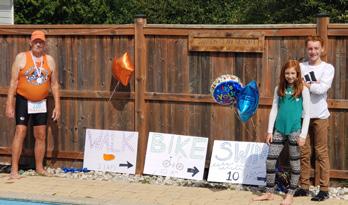
3 minute read
TRIUMPHS AND A TRIATHLON
Stroke survivor Art Jansen, with the support of his family, completed a mini triathlon organized by his son, which took the 74-year-old one hour and 18 minutes to complete.
Stroke survivor Art Jansen shares his story of determination and hope to inspire others.
Seventy-four-year-old Art Jansen gazes proudly at a photograph he never expected to see. In the photo, he is standing proudly with his family by his side after completing a triathlon. Not just any triathlon - but a family-organized event for him to mark his long journey of recovery after su ering a devastating stroke on Nov. 11, 2019. Art’s stroke was due to complications following a heart infection. He experienced weakness in his arms and face while in his home and immediately called 911. After spending a month at London Health Sciences Centre’s University Hospital for treatment of his heart condition, Art was transferred to St. Joseph’s Health Care London’s Stroke/Neurological Rehabilitation Program at Parkwood Institute where, over the next nine months, he would undergo intensive rehabilitation to regain skills and mobility.
According to the Public Health Agency of Canada, strokes are the leading cause of adult disability in the nation and the third leading cause of death. Every year, nearly 14,000 Canadians die from a stroke. The stroke left Art paralyzed on one side of his body and unable to speak, eat and walk. He assumed he would spend the rest of his days in a long-term care facility. “It was a very di cult time,” recalls Art. “It all happened just as the COVID-19 pandemic began and everything was locked down and uncertain. I would have virtual visits with my family and my daughter would sometimes visit through a closed glass window. I was very isolated.” Despite his condition and a global pandemic unfolding, Art was determined to push forward. “I knew I had to stay positive and set some goals for myself.” With the help of St. Joseph’s stroke rehabilitation team, which included nurses, physicians, speech pathologists and physiotherapists, Art began his journey of recovery. Working daily in the gym on strength and balance, he eventually progressed to short walks outside on the facility grounds. He also regained his speech.
St. Joseph's inpatient stroke rehabilitation program at Parkwood Institute Main Building is designed for individuals who have had a stroke or another neurological condition and would benefit from the expertise of a team to achieve their rehabilitation potential. The length of stay varies and is determined on an individual basis. A variety of approaches are tailored to each patient aimed at improving function and independence. “The stroke rehabilitation team were determined to help me succeed,” says Art.

Stroke survivor Art Jansen, left, stands proudly with this two grandchildren after completing a family held triathlon to celebrate his recovery after su ering from a devastating stroke in 2019.
With the help of the stroke rehabilitation team at St. Joseph’s Health Care London’s Parkwood Institute, Art Jansen exceeded his own expectations and regained his independence after su ering a devastating stroke in 2019. And succeed he did. After being discharged as an inpatient in July 2020, Art, an avid skier, swimmer and cyclist prior to his debilitating stroke, began rigorous training with a fitness expert. In Art’s exuberant cheering section were his children and grandchildren, who decided a celebration was in order to mark his progress. On Sept. 6, 2020, they held a mini triathlon – just for him - at his son’s place. The triathlon consisted of a 2.2-kilometre walk around the block, a 10-kilometre bike ride using an exercise bike, and 10 laps in his son’s backyard pool. “To have my family’s support throughout this journey has meant everything to me,” says Art, who has recently moved into his own apartment just a short walk from his son’s home. “You don’t realize how important your independence truly is until it’s suddenly taken away. A person’s goals might look di erent and that’s okay - it doesn’t have to be a triathlon. What’s important is to stay positive and keep moving forward throughout your recovery. It really does make a di erence.”










